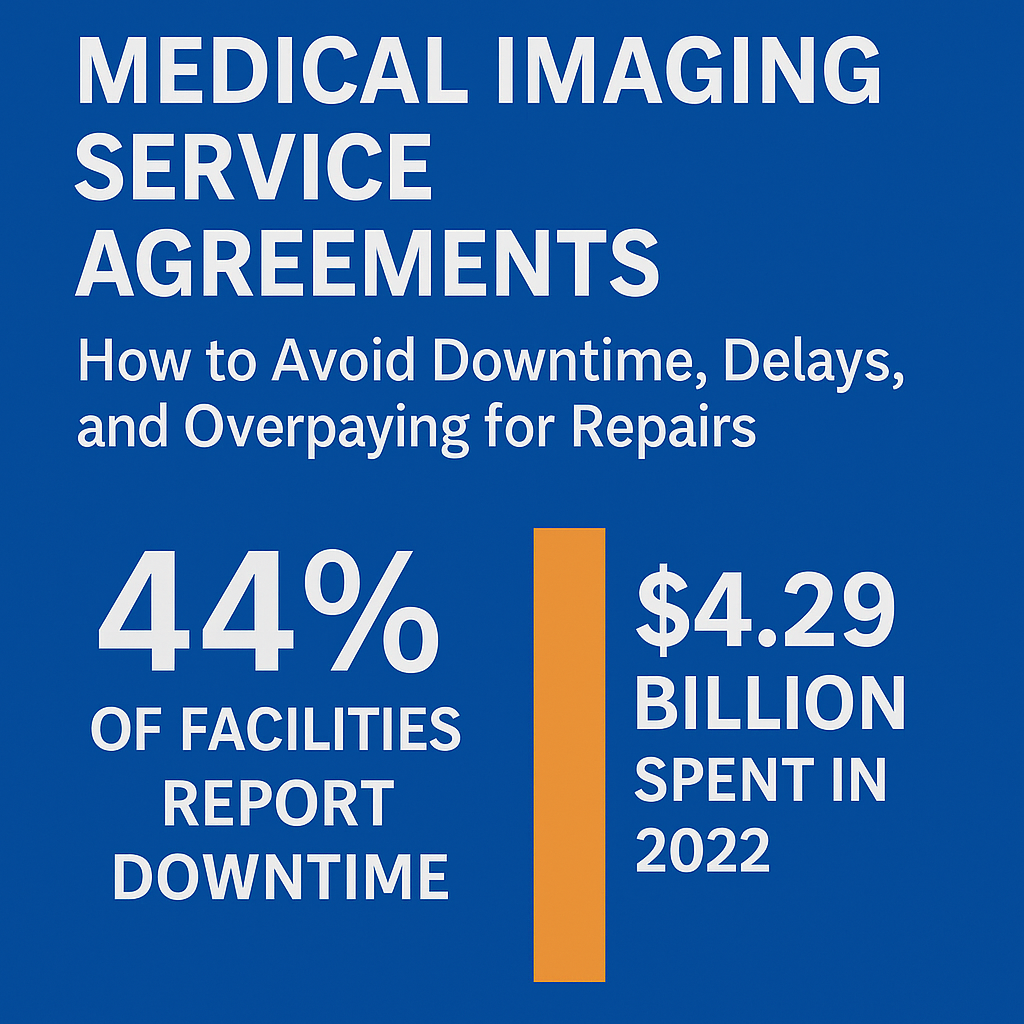Medical Imaging Service Agreements: The Silent Cost Killer Inside Your Diagnostics Budget
If you’re running diagnostics at a hospital or outpatient imaging center, you know that service agreements are more than just paperwork. They're risk transfer mechanisms. And too often, they transfer risk away from the vendor and squarely onto your team. At QDI, we've worked with facilities across 42 states. And what we see is consistent: Most imaging service contracts are written to sound comprehensive, while remaining vague enough to avoid accountability.
When your scanner fails—whether it's a Philips CardioMD, SPECT/CT system, or Biograph PET—you don't need "support availability." You need precision. You need a response window. You need escalation protocols. And you need parts that are already warehoused or sourced with traceability. That’s not a wishlist. That’s what uptime protection looks like in real-world diagnostics.
Downtime doesn’t just frustrate patients. It creates cascading workflow disruption and direct financial loss. A single system outage can translate to tens of thousands in missed revenue and irreparable erosion of referral relationships. When one imaging director told us she had to personally call 15 cardiac patients due to an unexpected outage, we didn’t hear frustration. We heard how emotionally unprotected administrators feel when contracts don’t deliver.
Yet year after year, many facilities renew those same contracts. Why? Because the language feels safe. Because the vendor is familiar. Because you don't want to start over. And because the agreement says "comprehensive" on the first page.
That’s where the problem starts.
QDI service contracts are built to be the opposite of that experience. They’re built to be readable. Actionable. Auditable. We define our callback times. We disclose our exclusions. We support cross-vendor environments, because we know GE and Philips often coexist in the same facility. And we warehouse critical parts so delays don’t become excuses.
Each QDI agreement includes preventive and corrective maintenance, full parts coverage (with clearly listed exceptions), and same-business-day response commitment for emergency issues. When resolution can’t happen within the committed timeframe, escalation isn't a vague promise. It’s a defined process. And every service event is documented in a format that's ready for your next ACR review or NRC audit.
This matters more than ever. With $4.29 billion spent on imaging service contracts in 2022 alone, the margin between efficiency and waste is growing. And with the share of service spend moving from OEMs to independent providers climbing to 50%, the market is waking up. Buyers are more educated. But the contracts haven't evolved. Most still prioritize vendor deniability over diagnostic reliability.
Facilities are changing how they think about refurbished equipment, too. Almost half of healthcare organizations say they're open to buying a refurbished system within the next 24 months. That number was unthinkable five years ago. But price pressures, software lockouts, and support limitations have forced the market to reevaluate what "new" really delivers.
And when it comes to servicing that equipment, your contract either amplifies that value or erodes it.
Every QDI agreement is backed by the principles of proactive service, vendor transparency, and zero ambiguity. We won't tell you we "strive" to deliver. We'll show you exactly when, how, and with what documentation. We won’t say “parts included” without defining which ones. We’ll walk through the list and explain how each is sourced, tested, and warranted.
Trust isn’t built on language. It’s built on delivery. And in imaging, delivery is all that matters.
A good agreement also makes administration easier. When a system fails, administrators don’t have time to cross-reference footnotes or debate vague phrasing. They need clarity. They need documentation. And they need to know that if escalation is required, the process is already in motion. That's why every QDI agreement includes pre-documented escalation flows and dedicated points of contact who stay consistent throughout the relationship.
These details matter not just for day-to-day operations, but for long-term compliance. Imaging administrators preparing for ACR renewal or NRC inspection rely on clean, accessible service records. Missing reports or vague maintenance logs can delay certification or trigger fines. That’s why QDI includes digital documentation after every visit, formatted and organized to pass audit thresholds without extra administrative labor.
This level of consistency is especially valuable for multi-site operators. When you're managing imaging systems across several buildings or regions, any service gap can echo across the network. We’ve helped network clients centralize service tracking, standardize contract language, and unify response protocols—so that no facility is left operating in the dark.
The shift to refurbished equipment has made this kind of service even more essential. Hospitals seeking to stretch capital budgets are increasingly choosing refurbished SPECT/CT or PET/CT units from partners like QDI. But service is what protects that investment. A high-quality system loses its value if parts access, field support, or documentation aren't airtight.
Our clients tell us the same thing: they don't just want lower costs. They want fewer interruptions. More consistency. Faster communication. And fewer “I don't know who to call” moments when timelines slip.
That’s what a service agreement should deliver.
And if yours doesn’t, we’d be happy to review it—no strings attached.
We offer free, no-pressure service agreement audits for hospitals, imaging clinics, and diagnostic service providers. We’ll walk through the document with you, highlight exposure risks, and outline exactly where better structure can reduce downtime, increase clarity, and protect revenue.
You don’t need to switch vendors to get insight. You just need someone who’s read hundreds of these and knows where the traps live.
Let’s fix that fine print.
Start your review at nuclearcamera.com/contact or email info@nuclearcamera.com. Your team deserves a contract that protects uptime, compliance, and sanity.
Because when a scanner fails, the contract shouldn’t fail with it.
